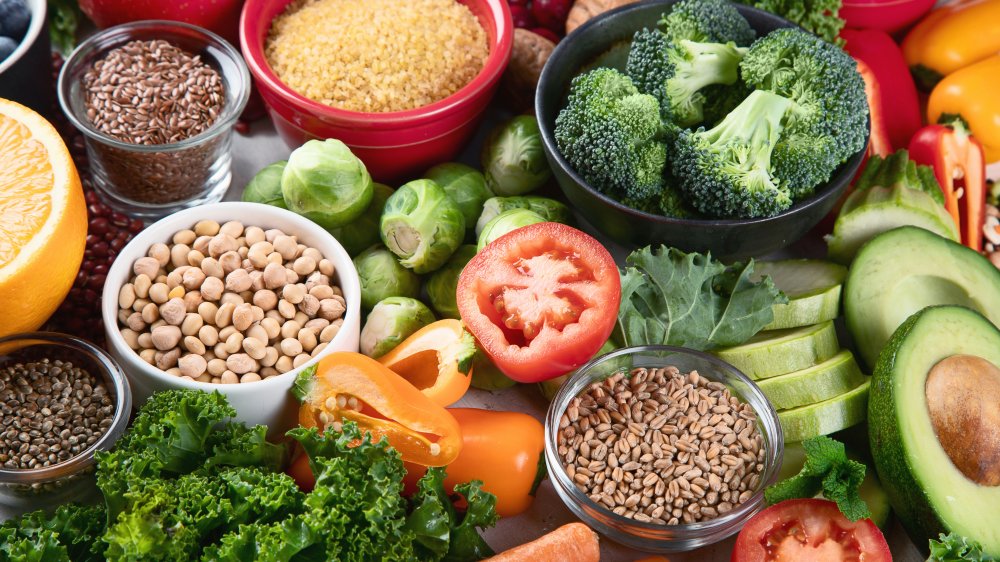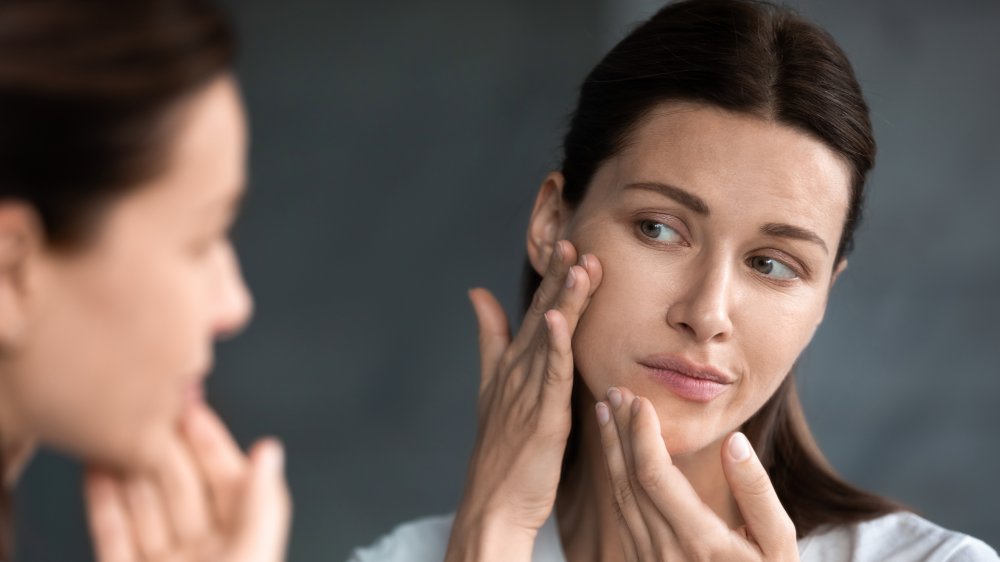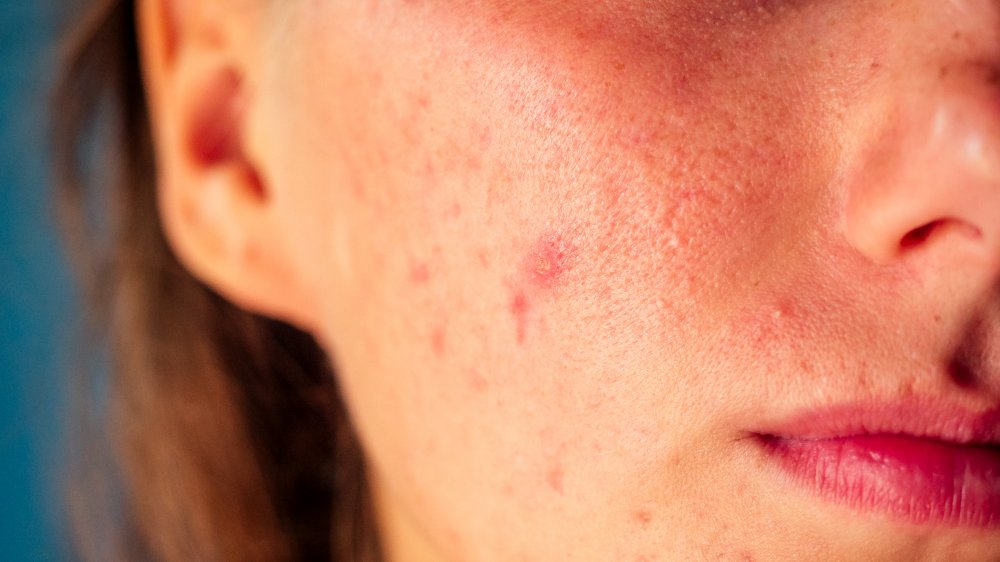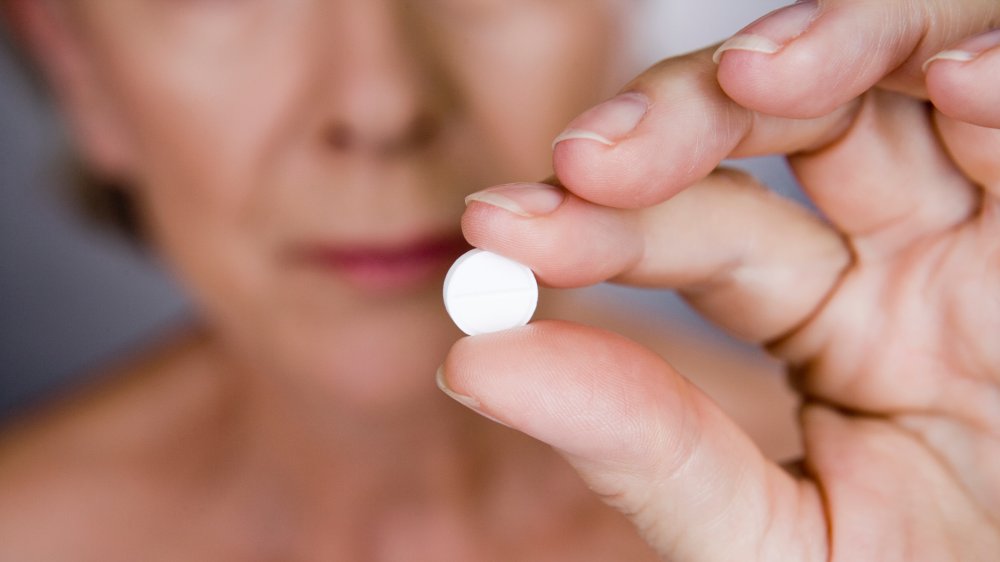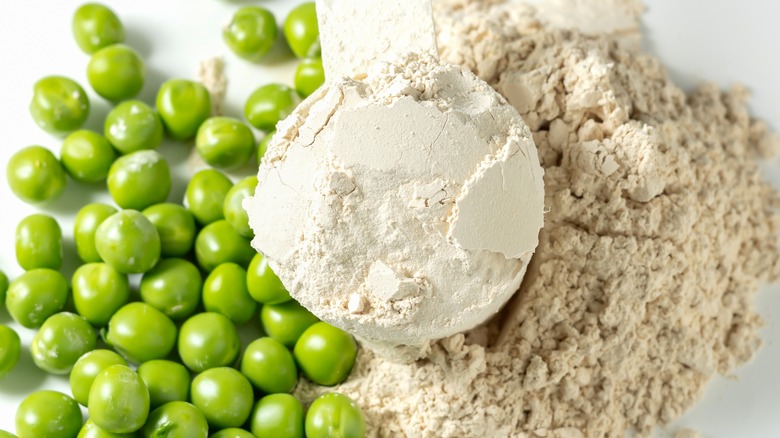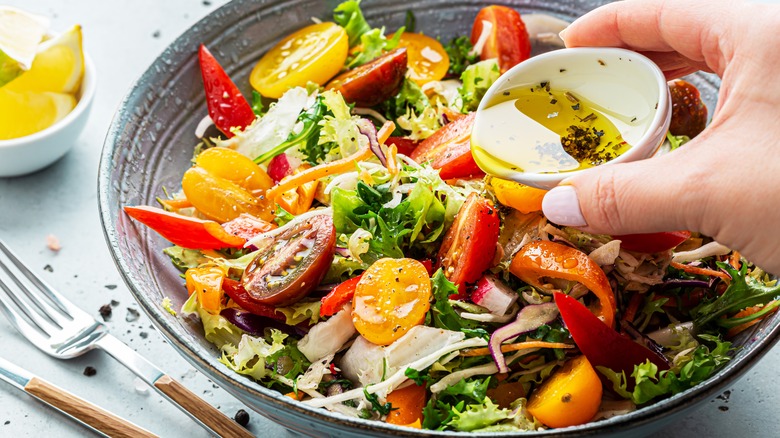The Reason Your Vegan Diet May Be Aging You Quicker
Many people adopt a vegan diet because it is supposed to be healthier for them, and in many people's minds, healthy equals better looking. In other words, much of what we do for the sake of our health, we really do because we want to look better. And with celebrities including Carrie Underwood, Emily Deschanel, Emma Chamberlain, Demi Moore, and Natalie Portman constantly touting the benefits of a vegan diet, well, it's no wonder that many who switch to plant-based eating might well expect their virtuous eating to be rewarded with outer as well as inner beauty.
Sadly, it doesn't always work out that way, at least if you don't have all of the other perks that come with a celebrity lifestyle (such as skin treatments that are "totally not plastic surgery" but have the same near-miraculous results at a pretty similar price tag). Some skincare experts have reported on a condition they call "vegan face" (via Evening Standard), and it's not too pretty.
Veganism can cause loose, saggy skin
Inge Theron, who is the founder of Face Gym, is actually a fan of the vegan diet, but she admits it has some drawbacks as far as how it can make you look. She told the Evening Standard that most vegans exhibit a marked lack of elasticity in their facial skin due to a lack of collagen and elastin. These two substances are made up of protein, and Theron warns, "If your body doesn't get the protein that it needs, it can cause your skin to become dry, sallow, crepey and lackluster, with saggy jowls and a loss of muscle tone and elasticity." She does not feel that you can get sufficient protein from plants alone, so cautions appearance-conscious vegans that they will always need to use supplements.
NYC skincare provider Joanna Vargas agrees that "being a vegan can be aging." As she told Furthermore, "I see 27-year-old vegans who don't have good elasticity. There's no snap-back to their skin tone because they're not getting enough protein." She says that cutting meat, fish, eggs, and dairy out of your diet entirely can leave you short on essential fatty acids and B vitamins and this deficiency can leave your skin dull and lifeless.
However, according to the National Academy of Sports Medicine, this problem isn't all that common. They note that most people can get more than adequate protein by including a variety of plant-based proteins in their diet.
Veganism can also lead to breakouts
Another "fun" thing about a vegan diet is the fact that it can lead to frequent breakouts. A skincare blogger with The Klog wrote about what happened when she adopted a vegan diet — and what happened on her face was zits, a whole lot of zits. She said that despite the fact that many had warned her to expect some skin issues when she announced her intent to go vegan on Instagram, she was still somehow envisioning that her skin would glow with meat-free righteousness. Well, that didn't happen, so she reached out to nutrition expert Brooke Alpert to ask why. As Alpert told Byrdie, "Chances are ... you replaced meat from your diet with more sugar or refined carbohydrates. Eating more carbohydrates and sugar can directly influence acne production."
Other experts think the link between veganism and severe acne lies in the fact that vegan diets tend to be short on vitamin A, omega-3 fatty acids, and zinc, which are all nutrients that can prevent breakouts. What's more, many plant-based foods contain antinutrients that prevent the absorption of zinc and may cause digestive upsets that also trigger pimple production (via GoodGlow).
Here's how to counter the negative effects of a vegan diet
Does eliminating animal products from your diet mean that you'll have to live with a saggy, baggy, spotty face? Not necessarily. As functional medicine specialist Susan Blum, M.D., M.P.H., told Furthermore: "A lot of people eliminate meat and animal products in an effort to be healthier, but you really have to know how to eat right to make being a vegan work for you."
Blum suggests vegans incorporate protein into every meal, preferably in more natural forms such as legumes, nuts, and whole grains, but warns against overly-processed soy meat substitutes. GoodGlow actually cautions against using any types of soy products if breakouts are a problem for you since these can lead to hormonal imbalances that may result in some pretty nasty acne. While zinc supplements can help with breakouts, they'll be ineffective if you take them while consuming foods high in zinc-blocking phytic acid, such as raw spinach or dark chocolate.
If things are looking really rough, you can always indulge in a vegan-friendly facial such as the one offered by Face Gym. Theron says that if you want to take a DIY approach, though, the best thing you can do, besides boosting your protein intake, is to take skin pre-and pro-biotics and collagen supplements and to use a really strong exfoliator in order to get rid of all the dull, dry skin.
How to supplement a vegan diet to help your skin
According to Learn Skin, protein has amino acids that promote collagen and elastin. These give our skin structure and fullness. Proline and glutamate can stimulate collagen production and improve our skin. Plant-based protein sources lack the complete amino acid profile of animal proteins, so supplementing or adding a wide variety of plant-based proteins is essential (via News Medical Life Sciences).
Vitamin B12 and iron deficiencies from a vegan diet can lead to dark circles under the eyes (via Byrdie). MedicalNewsToday suggests finding plant-based proteins such as edamame and tofu to increase your protein intake while supplementing your B12 and iron levels. Be sure to include a variety of plant-based foods rather than sticking to the same foods so you can eliminate any nutritional deficiencies (via Byrdie). According to a 2022 article in Dermatology Practical & Conceptual, supplementing your diet with either oral or topical collagen can slow aging skin and reduce wrinkles.
You could also consider adding probiotics to your vegan diet to restore your skin's microbiome. A 2016 review in the Journal of Drugs in Dermatology determined that probiotics can help slow the signs of aging skin by balancing the pH of the skin, reducing sun-related damage, and relieving oxidative stress.
Vegan diets can benefit the skin
According to a 2021 study in the Journal of the Academy of Nutrition and Dietetics, a plant-based diet can slow the aging process of your skin. Fruits and vegetables can help reduce inflammation and oxidative stress because they are rich in antioxidants. Vitamin C is especially helpful in synthesizing collagen. Nuts and legumes are rich in unsaturated fatty acids, which can reduce sun-related aging. According to Healthline, it's important to properly plan your vegan diet so that you're getting adequate nutrients from your plant-based food.
It's also important to avoid consuming too much of one food or extract. A 2020 study in Nutrients found that women who ate ½ cup of mangoes each day had a reduction in wrinkles after four months. However, the women who ate 1½ cups of mangoes each day had more wrinkles. The researchers concluded that the sugar increase from the mangoes disrupted the skin's collagen structure.
Your diet isn't the only factor that can speed up or slow your skin's aging. Smoking, sleep, exercise, and the environment can speed up aging on your skin through inflammation and oxidative stress (via Journal of the Academy of Nutrition and Dietetics). If you add too much time in the sun, you're also adding wrinkles and age spots.

